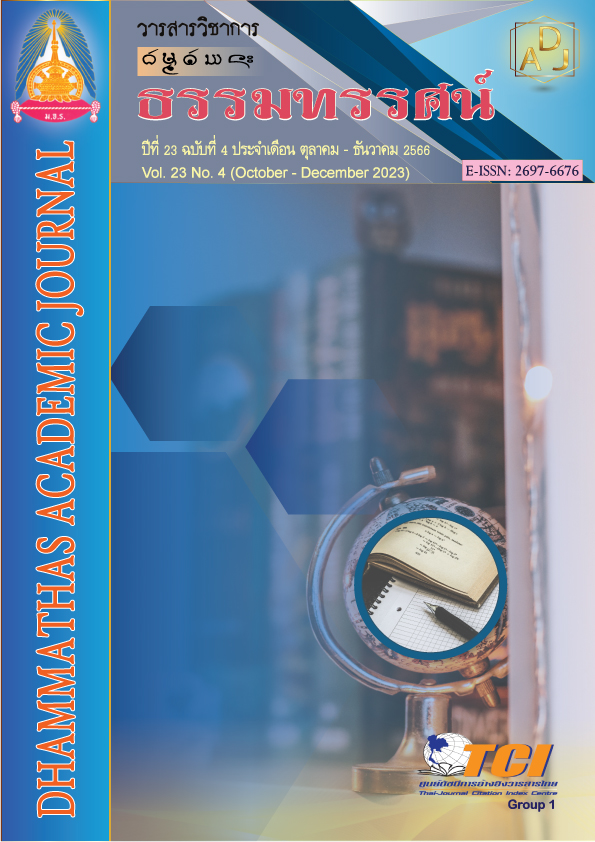[SUCCESS IS A JOURNEY]: Conceptual Metaphors on Pantip.com Website
Main Article Content
Abstract
The research article aimed to analyze metaphorical words reflecting the metaphor concept of success as a journey in Thai according to Lakoff and Johnson's conceptual metaphors. The research applied a qualitative method. The findings were presented by using a descriptive analysis method, and were analyzed by the use of Lakoff and Johnson's conceptual metaphors. The data was collected from 38 chatrooms on Pantip.com website.
The study found: 133 metaphorical statements about success as a journey. The metaphors that appeared had meanings related to travel in 5 characteristics, consisting of travel characteristics, travel places, travel directions, travel distances, and travel routes. The metaphors that appeared were related to travel in 5 ways, which helped to reflect the human thinking system that is connected by having a source domain or a concrete analogy is a journey and a target domain or an abstract analogy that is a success. In addition, the metaphors helped to reflect the characteristics of structural metaphor that could compare the elements of source domains and the elements of target domains in pairs. Furthermore, the metaphors also helped to see the perspectives of language users as Pantip.com website represented the language use of people in today’s society that helped to see the perspectives of people in society that were connected to a success, which is something that everyone strives to achieve, and a journey, which is something that everyone is familiar with and well-understood.
Article Details

This work is licensed under a Creative Commons Attribution-NonCommercial-NoDerivatives 4.0 International License.
เพื่อให้เป็นไปตามกฎหมายลิขสิทธิ์ ผู้นิพนธ์ทุกท่านต้องลงลายมือชื่อในแบบฟอร์มใบมอบลิขสิทธิ์บทความ ให้แก่วารสารฯ พร้อมกับบทความต้นฉบับที่ได้แก้ไขครั้งสุดท้าย นอกจากนี้ ผู้นิพนธ์ทุกท่านต้องยืนยันว่าบทความ ต้นฉบับที่ส่งมาตีพิมพ์นั้น ได้ส่งมาตีพิมพ์เฉพาะในวารสาร วิชาการธรรม ทรรศน์ เพียงแห่งเดียวเท่านั้น หากมีการใช้ ภาพหรือตารางของผู้นิพนธ์อื่นที่ปรากฏในสิ่งตีพิมพ์อื่นมาแล้ว ผู้นิพนธ์ต้องขออนุญาตเจ้าของลิขสิทธิ์ก่อน พร้อมทั้ง แสดงหนังสือที่ได้รับการยินยอมต่อบรรณาธิการ ก่อนที่บทความจะได้รับการตีพิมพ์References
ณัฐพร พานโพธิ์ทอง. (2556). วาทกรรมวิเคราะห์เชิงวิพากษ์ตามแนวภาษาศาสตร์: แนวคิดและการนำมาศึกษาวาทกรรมในภาษาไทย. (พิมพ์ครั้งที่ 2). กรุงเทพฯ: โครงการเผยแพร่ผลงานวิชาการ คณะอักษรศาสตร์ จุฬาลงกรณ์มหาวิทยาลัย.
ธนพล เอกพจน์. (2561). อุปลักษณ์เชิงมโนทัศน์ความจนในภาษาไทย: กรณีศึกษาการใช้ภาษาไทยบนเว็บไซต์ของพันทิปดอทคอม. รมยสาร, 16(1), 377-400.
นภัทร อังกูรสินธนา. (2555). มัชฌิมาปฏิปทา: อุปลักษณ์การเดินทางในพุทธศาสนา. การประชุมวิชาการระดับชาติ มหาวิทยาลัยราชภัฏนครปฐม ครั้งที่ 4 75 ปี จากโรงเรียนสตรีฝึกหัดครูสู่มหาวิทยาลัยเพื่อการพัฒนาท้องถิ่นอย่างยั่งยืนและการเตรียมพร้อมสู่ประชาคมอาเซียน, 12-13 กรกฎาคม 2555, (หน้า 457-466). นครปฐม: มหาวิทยาลัยราชภัฏนครปฐม.
พิมพ์พิชา ดวงประเสริฐ. (2560). ปัจจัยที่มีอิทธิพลต่อความตั้งใจในการใช้เว็บไซต์เครือข่ายสังคมอย่างต่อเนื่อง: กรณีศึกษาของพันทิปดอทคอมหน้า. (ปริญญานิพนธ์วิทยาศาสตรมหาบัณฑิต). กรุงเทพฯ: มหาวิทยาลัยธรรมศาสตร์.
ราชบัณฑิตยสภา. (2560). พจนานุกรมศัพท์ภาษาศาสตร์ (ภาษาศาสตร์ทั่วไป). กรุงเทพฯ: สำนักงานราชบัณฑิตยสภา.
ศุภชัย ต๊ะวิชัย. (2556). การขยายความหมายของคำว่า “หลัง” ในภาษาไทย. การประชุมวิชาการมหาวิทยาลัยมหาสารคามวิจัย ครั้งที่ 9 การวิจัยสู่ประชาคมอาเซียน ครั้งที่ 2, มหาวิทยาลัยมหาสารคาม, 12-13 กันยายน 2556, (หน้า 24-41). มหาสารคาม: มหาวิทยาลัยมหาสารคาม.
_______. (2561). สถานภาพงานวิจัยอุปลักษณ์เชิงมโนทัศน์ในภาษาไทย. วารสารอักษรศาสตร์ มหาวิทยาลัยศิลปากร, (50)2, 202-254.
Lakoff, G. and Johnson, M. (1980). Metaphor we live by. Chicago and London: University of Chicago Press.
_______. (2003). Metaphor we live by. Chicago and London: University of Chicago Press.
Maslow, A. H. (1943). A Theory of Human Motivation. Journal Psychology Review, 50, 370-396.
Siqi, Y. (2561). อุปลักษณ์มโนทัศน์ “ความฝันจีนเป็นการเดินทาง”: มุมมองทางปริชาน. วารสารมนุษยศาสตร์ปริทรรศน์, 40(1), 74-93.
The Lexicon Webster dictionary. (1997). The New Lexicon Webster's Dictionary of the English Language. New York: The English Language Institude of America.

